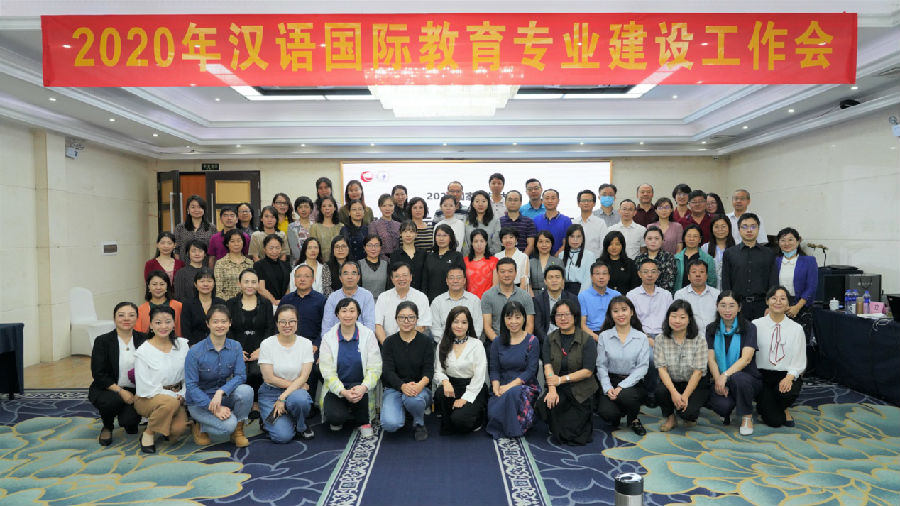 From 20-21 November, the 2020 Construction Work Conference for the International Chinese Language Education major of the Open University of China (OUC) was held in Guangzhou.
From 20-21 November, the 2020 Construction Work Conference for the International Chinese Language Education major of the Open University of China (OUC) was held in Guangzhou.
Those attending the conference included 86 teaching administrators, responsible personnel, course leaders, and tutors from 31 branches (including the OUC Experimental School). They held discussions on the opportunities and challenges faced by the construction of international Chinese language education on the theme of “Gathering Knowledge for Common Development and the Positive Construction of International Chinese Language Education.” Vice president Yang Xiaotang from the OUC, president Xiong Jun from the Guangzhou Branch, president Liu Jianguo from the Harbin Branch, and vice president Xiong Kun from the Shenzhen Branch attended the opening ceremony of the conference.

Yang Xiaotang pointed out that the OUC’s internationalisation should follow the trend of the times for peace, development, cooperation, and win-win cooperation and “embrace the world with a more open mind, and to contribute to the world with more dynamic civilised achievements.” It can achieve this by focusing on “adhering to a path of peaceful development to promote the construction of a community of shared future for all mankind” as proposed by General Secretary Xi Jinping. He said that the Ministry of Education recently issued The OUC Comprehensive Reform Plan and put forward the requirement to “work hard to develop the OUC into a major platform for lifelong education in China, a major platform for online education, a platform for flexible education, and a platform for international cooperation.” The construction of the International Chinese Language Education major is part of work to internationalise the university, to further expand international admissions, and to cultivate international Chinese language teachers with the characteristics of the OUC.
Yang also gave an introduction to the construction of the OUC’s overseas learning centres. To date, the OUC has established two overseas learning centres in Zambia and Tanzania. The learning centre in Pakistan will open soon, and preparation is underway for the learning centres in Kazakhstan, Tajikistan, and Papua New Guinea. In addition, the OUC has signed memorandums of cooperation and understanding with several institutions of distance education in Turkey and Spain to establish online Confucius institutes.
Yang spoke of three hopes. The first is his hope that the branches in attendance will become drivers of the internationalisation of open universities, and will do the relevant work by relying on the strength of the system. The second is his hope that continuous new innovation will be made in the curriculum, resource, and learning evaluation of the OUC’s international Chinese language education. The third is his hope that the teachers present will develop themselves into world-class teachers and become the main force for the internationalisation of open universities by leveraging their own strengths and conditions.
In combination with the situation in China and aboard, the international development plan of the OUC and Guangzhou Branch, and the development of overseas Cantonese, Xiong Jun put forward two views. One is that in addition to English, teachers of Chinese should also know typical dialects such as Cantonese and other local languages if they are to do better of going global. The second is that the OUC should take into consideration the diverse needs of the students in its international Chinese language education programme in order to integrate vocational education with Chinese language education to meet the demands of the students for employment or job selection after graduation.
Shao Yipeng, head of the Division of Chinese and Foreign Languages Exchanges and Cooperation Teaching and Resources of the Ministry of Education, introduced and analysed the status quo and future development demands of the construction of teaching resources for international Chinese language education. Liu Zhanrong, head of the International Department of the OUC, reported on the strategic planning of the OUC’s international development, and introduced the phased achievements made.
Since the OUC International Chinese Language Education opened for enrolment in March 2020, the Guangzhou, Fujian, and Harbin branches have admitted a total of 373 students over two semesters. Wu Qing’er, director of the Admission Office, and Chen Yilan, responsible person and associate professor of international Chinese language education at the Guangzhou Branch, as well as Liu Jianguo, vice president and professor at the Harbin Branch, shared their experience in enrolment, teaching, and team management. Moreover, teachers of international Chinese language education from the International Department introduced team building within the major. At the conference, core members of the three course teams were issued appointment certificates.
The OUC has worked hard to set up an international cooperation platform for the sharing of quality teaching resources, to build an internationalised teaching team, and to explore a talent cultivation model that meets the needs of international development by actively serving the national educational development strategy, upholding the planned and coordinated development of the OUC system, adhering to the integration of objectives and problems, and sticking to the combination of “going global” and “bringing in.” A professional one-stop flat management model will be applied to the International Chinese Language Education major as a window and “experimental plot” for the OUC’s internationalisation. The entire OUC system will be coordinated to focus on the university’s internationalisation and to write a new chapter for the OUC’s comprehensive reform in the new era.
Written by Cui Jiaxing and photographed by Miaomiao, OUC